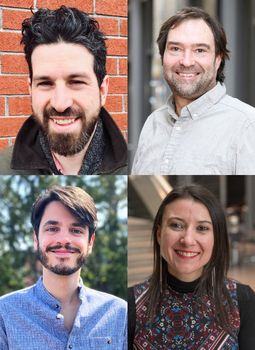
Guillaume Lajoie, professor in the Department of Mathematics and Statistics at UdeM and researcher in Mila, Numa Dancause, Marco Bonizzato and Marina Martinez, professors in the Department of Neuroscience at the Université de Montréal
Credit: Guillaume Lajoie : Courtoisie Numa Dancause : Claude Gauthier | UdeM Marco Bonizzato : Courtoisie Marina Martinez : Amélie Philibert | UdeM
Scientists have long studied neurostimulation to treat paralysis and sensory deficits caused by strokes and spinal cord injuries, which in Canada affect some 380,000 people across the country.
Now a new study published in the American journal Cell Reports Medicine demonstrates the possibility of autonomously optimizing the stimulation parameters of prostheses implanted in the brains of animals, without human intervention.
Funded by IVADO and others, the work was done at Université de Montréal by neuroscience professors Marco Bonizzato, Numa Dancause and Marina Martinez, in collaboration with mathematics professor and Mila researcher Guillaume Lajoie.
The study frew out of of an important interdisciplinary collaboration between researchers who combine expertise in neuroscience and artificial intelligence, two fields of expertise in which the UdeM stands out internationally.
'A very promising phase'
"Neuroprostheses ─ devices designed to restore connections between neurons following a loss of motor function ─ are entering a very promising phase of their development," said Lajoie. "We are demonstrating the benefits obtained by autonomously optimizing their parameters."
If the performance of these prostheses has increased, it's thanks to the autonomous learning algorithms put forward by the researchers, added Bonizzato. "Optimization algorithms allow us to design very refined neurostimulation protocols and personalize treatments according to the condition of each patient."
For his part, Dancause believes that although "there are several ways of stimulating the brain, the contribution of artificial intelligence is essential to make the most of the data collected and anticipate conditions that do not yet exist."
With these technological advances, scientists are closer to finding new neuroprosthetic solutions to improve the treatment of pathologies such as spinal cord injuries and strokes, or deep brain stimulation through neuromodulation to treat conditions such as Parkinson's disease.






